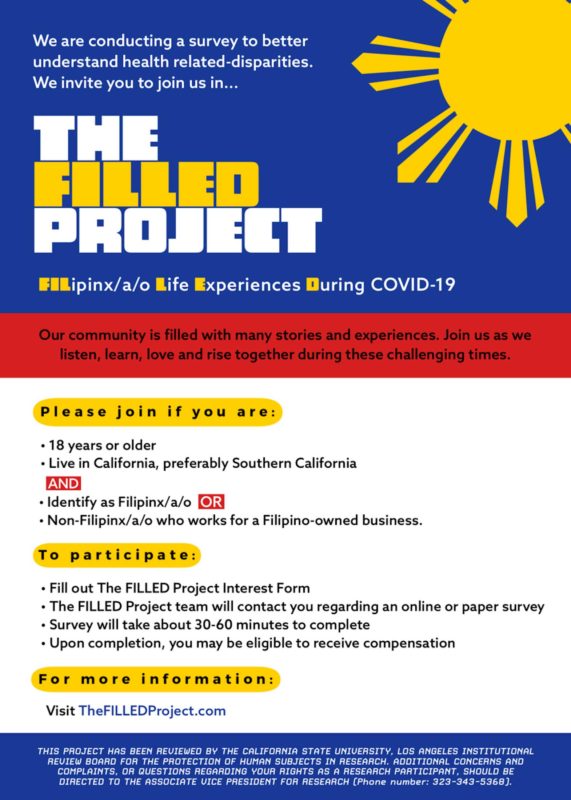Fil-Am health disparities survey seeks respondents

LOS ANGELES – Researchers in Los Angeles are seeking Filipino Americans in the state to participate in a survey meant to help better understand health disparities in and the impact of COVID-19 on the community.
Melanie Sabado-Liwag, principal researcher for the survey and a public health professor at California State University, Los Angeles, said the survey was sparked by community organizations’ desire to keep serving the Filipino American community despite the pandemic’s stay-at-home restrictions.
Service was difficult to provide while staff for those organizations were working from home. As conversations with groups unfolded, they realized they didn’t know what community members needed, what they were doing to cope during the pandemic and what disparities the community was facing.
Precisely how the pandemic has affected Filipino Americans is unclear due to the way data collection in the United States aggregates Asian American subgroups into a single category, which masks the specific needs of each group.
But reports have noted that the community’s death toll in California surpassed its share of the population. Filipino Americans account for about 30 percent of COVID-19 deaths among registered nurses, despite constituting 4 percent of registered nurses across the country.
The Sabado-Liwag-led survey asks a range of questions including ones about mental health, health behaviors, racism and attitudes toward vaccinations and social unrest during the pandemic. Once researchers collect results, they plan to next collect qualitative information via interviews or focus groups to contextualize their understanding of what the data shows.
Researchers aim to obtain survey responses from at least 250 participants, but hope to collect up to 700, Sabado-Liwag said. They’re looking for California residents – preferably those in Southern California – who identify as Filipinx/a/o and are 18 years or older, or non-Filipinx/a/o who work for a Filipino-owned business.
Sabado-Liwag said it’s important for the community to know surveys like the one she’s spearheading exist, and that they participate in this kind of research. She added that Filipino Americans typically lack active participation in research, and its lack of representation affects its ability to get the resources it needs.
“I hope that people understand that there are people in the community that do want to hear their experiences, who do want to hear their stories; that they are important, and they shouldn’t brush it off like, ‘Oh, everybody’s going through it’,” she said. “But how do we really know that everybody’s going through it if you don’t document it? If we don’t collectively provide that voice for the community?”
Data and research is how money will get funneled into the community, she noted.
“As a Filipino to our Filipino community, I’m kindly requesting their help for us to be visible,” she said. “And the best way I know how to do that is through their sharing of information.”
Sabado-Liwag said she hopes the information her team collects from the survey can be used to find sustainable ways to work with the Filipino American community after the pandemic, to create any necessary interventions and influence policy.
Individuals interested in participating in the survey can fill out an interest form found on The Filled Project website. The survey is available online and in paper form, and is expected to take between 30 and 60 minutes to complete.
The Filled Project survey has been approved by the Institutional Review Board at California State University, Los Angeles. The board offers protections to individuals who participate in research it approves.

